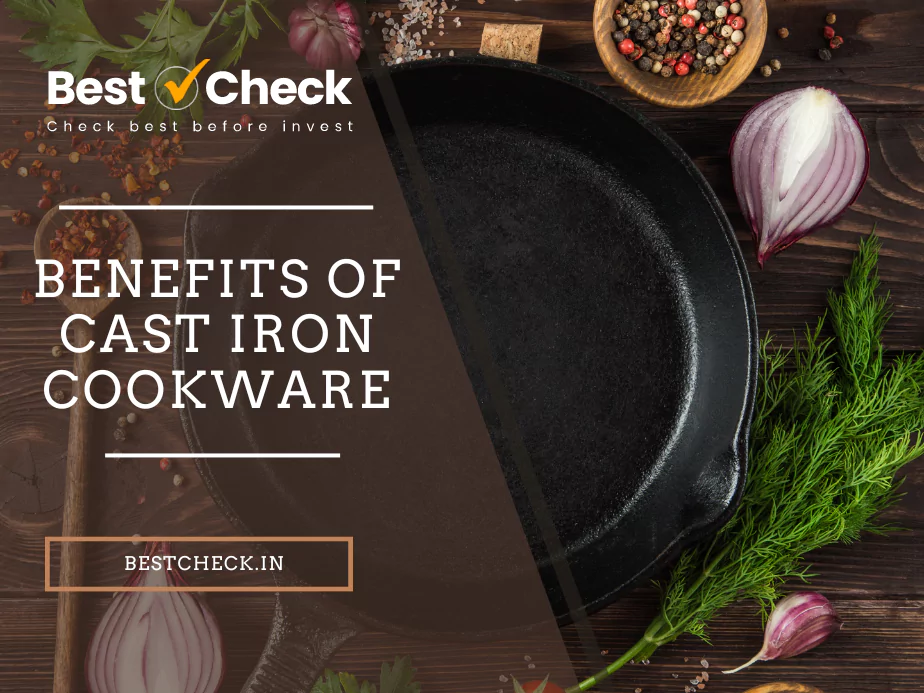Impressive Benefits Of Cast Iron Cookware

The aroma and taste of the meal cooked with cast iron cookware take us back to the olden days and remind us of the wholesome feeling of eating grandma’s delicious dishes. There is something uniquely special and antique about cooking with cast iron cookware. And that is why cast iron pan and cast iron skillets are still popular.
Other than the homely feeling, there are many other benefits of cast iron cookware. The major benefit of cast iron utensils is that they are very convenient as there is a variety of cast iron cookware, from cast iron pans and cast iron skillet to cast iron Dutch ovens. Additionally, there are also many health benefits of cooking with cast iron cookware. But before we get into that, let us know what is cast iron in a better way.
1 What is Cast Iron Cookware?
The majority of cast iron cookware is made by melting iron ore and steel at very high temperatures. As soon as the metals are bonded together and shaped, they are usually sandblasted to remove any impurities. There are also traces of other alloys in cast iron, such as manganese and silicon. Such materials strengthen cast iron and modify its mechanical properties for the best quality.
Cast iron is classified into major subtypes such as:
- Grey Cast Iron
- Ductile Cast Iron
- White Cast Iron
- Malleable Iron
- Compacted Graphite Iron
2 Why cooking with cast iron cookware is beneficial?
Apart from the mechanical properties, there are also many health benefits of cooking with cast iron cookware. To make you understand this, let us dive deeper to understand the daily iron requirements in any human. Heme and Non-heme are the two types of iron, and both types are present in foods. Generally speaking, heme iron, which occurs in animal protein, is more readily bioavailable, meaning it is processed by our bodies. In comparison, non-heme iron is dependent on other nutrients, such as vitamin C.
Now, cast iron cookware has become beneficial as it is a natural way to add more iron to your diet. It transfers necessary iron nutrients into the foods cooked in cast iron pans or cast iron skillets. Additionally, any food with a low iron amount can also receive more iron if cooked in iron cookware, as cast iron will transfer a small amount of mineral from the pan to your food and ultimately to your body. Because of this health benefit, cooking with cast iron cookware is extremely healthy for people with iron deficiency.
This is why it is never too late to switch to cast iron utensils from your regular non stick cookware. Keeping in mind this major health benefit, let us discuss some other advantages of cast iron cookware.
3 Major Benefits of Cast Iron Cookware.
Cast iron cookware has been used for many years, and it still remains one of the most popular culinary tools today. The reason is that cast iron is exceptionally long-lasting, durable and sturdy. If you invest in good quality cast iron cookware once, you are bound to relish its best potential for years. Another very special benefit of cast iron cookware is its nonstick surface. Because of this helpful feature, cast iron utensils are a healthier alternative to harmful non-stick utensils.
Let us explore more such advantages of cast iron cookware. Cast iron cookware has been used for many years, and it still remains one of the most popular culinary tools today. The reason is that cast iron is exceptionally long-lasting, durable and sturdy. If you invest in good quality cast iron cookware once, you are bound to relish its best potential for years. Another very special benefit of cast iron cookware is its nonstick surface. Because of this helpful feature, cast iron utensils are a healthier alternative to harmful non-stick utensils.
Let us explore more such advantages of cast iron cookware.
Affordability
There is a misconception that cast iron cookwares are extremely costly because of their weight and durability. To erase this misconception, let us tell you that cast iron is quite affordable. Lodge cast iron is made locally, and that is why it is cheaper than many other nonstick cookware. And since most cast iron cookware is normally sold at a reasonably affordable price and since it lasts for a long time, it could be viewed as a cost-effective, one-time investment that is worth your money. Of course, you can find good quality cast iron utensils in thrift stores or any antique second-hand shops too.
Longevity
Cast iron lasts for generations. It is mostly indestructible because of its heavy gauge and durability. And because of this, you might have seen your grandmother pass on her favourite cast iron pan or cast iron skillet to your mother. Also, pre-seasoned cast iron cookware can prevent rust in bare cast iron. This way, cast iron cooking is highly beneficial.
Natural Nonstick Coating
Cast iron pans and utensils avoid harmful chemicals, and seasoned cast iron cookware has a naturally nonstick surface. Enameled cast iron has a nonstick surface which is better than questionable nonstick utensils with Teflon. We also recommend buying pre-seasoned cast iron skillets or pans with vegetable oil. This natural oil seasoning avoids chemical seasoning and becomes a healthier choice. Because of this benefit, cooking in cast iron pans is more accessible as the food doesn’t stick to the surface.
Even Heat Distribution
Because of the thick layer of bare cast iron, the cookware retains heat and provides even heat distribution. Cast iron heats the food evenly, and the thicker material of cast iron holds heat more, keeping food warm for a long time. Also, because of its high heat retention, this cookware can be used for deep frying, roast chicken or making baked goods.
Pro Tip: Do not put your hot cast iron utensils directly under cool water, as it might cause cracking.
Cleaning Cast Iron Cookware is Easy
You might have heard that maintaining new cast iron and cleaning them is difficult. Well, not really. It is true that you need to clean cast iron utensils more often to clean acidic foods and their aroma. However, cleaning cast iron pans or cast iron skillets is not difficult. You just have to wash them by hand. It is necessary to use mild soap only if necessary (in case of cooking acidic foods such as making tomato sauce, lemon juice, etc.). In most cases, washing cast iron utensils with water is recommended for the utmost care.
Versatile Cooking
Cast iron cookware works well with many heat sources. Most cast iron pans and cast iron skillets are gas stove, electric stovetop and induction stovetop compatible. It can also be used for camping trips or directly placed into a Dutch oven. Also, there is a variety of cast iron utensils in various sizes and shapes. Some popular cast iron utensils include cast iron pans, cast iron skillet, cast iron kadai, cast iron casseroles with lids, lodge cast iron bread pans, cast iron grilling pans, etc. Some of these utensils can also be put in the oven to bake food.
Because of this versatility, you can create a variety of menus and many foods by cooking with cast iron utensils. You can cook acidic foods, roast chicken, baking pies, frying, and many more things.
Can be Used for Cooking and Serving
Cast iron cookware can be used for cooking food as well as serving them for its raw, antique look. Enameled cast iron looks aesthetically pleasing. That is why you can use cast iron utensils to cook food as well as use it as a serving dish for a traditional touch to your table setting.
You don't have to use too much oil in a cast iron skillets
Pre seasoned cast iron utensils do not need too much oil because they are already seasoned with vegetable oil. This pre seasoning also gives a non stick surface along with many benefits. We recommend that you add a thin layer of oil to your new cast iron skillet to season it before using it to cook food.
After learning about many benefits and health benefits of cast iron cookware, let us learn how to maintain a cast iron utensil for the longer run.
4 How to maintain a cast iron pan?
It is necessary to take utmost care of your cast iron utensils because even though they are sturdy, they need careful maintenance. Here are a few points that you need to know to prolong the life of your cast iron utensils.
Season it
The seasoning on your cast iron utensil is the reason for its non stick surface. We recommend that you buy pre-seasoned cookware. However, if you have bought new cast iron utensils, you will want to create a more efficient seasoning after thoroughly cleaning the pan. Check out our article on how to season cast iron cookware to know more about re-seasoning your utensils.
Regular Cleaning
Cast iron absorbs flavours easily, which is why cleaning the utensils after each use is mandatory. Regular cleaning cast iron utensils also prevents rust and maintains their nonstick coating. Here are a few points to know while cleaning your cast iron utensils.
- Do not use a dishwasher. Instead, clean the utensils by hand.
- Rinse with lukewarm water.
- It is recommended to avoid the use of soap altogether.
- Use a bit of salt to remove the smell of cooked food from the utensils.
- Do not scrub the surface intensely. It might scratch the surface, and food might get stuck in the cracks. You can use a gentle brush or plastic pan scraper to remove stuck-on food.
- Dry the pan with a soft napkin.
- Cool the pan and store until the next use.
Store it Safely
Make sure that your utensils are completely dry before storing them. Hanging the cast iron cookware is always a good idea. However, if you are stacking it on the shelves, make sure to put a single paper tower between two utensils. This will protect the surface from getting damaged and scratched. Also, it is wise to store these utensils higher on the shelf to avoid any accidents.
Re-season It As Per the Requirements
It is always a good idea to re-season your cast iron cooking tools from time to time. Adding a thin layer of oil to your cast iron pan and heating it in the gas stove or oven until the oil’s smoke point can help maintain the nonstick coating. Know that it is a good time to re-season the cookware when you see the utensils turn light in colour or when you notice rust on the surface.
5 Wrapping up
Cast iron cookware is a smarter and healthier alternative to nonstick cookware, and it lasts for years! It is never late to switch to cast iron utensils as there are many benefits, mechanical as well as health benefits, as we saw. If you want to make a switch or try cast iron utensils, check out our article on the best cast iron cookware in India. These utensils are budget-friendly and offer amazing cooking performance. That is why investing in them is always a great idea.
If you already cook with cast iron utensils, share with us your experience in the comment section below. Also, if you are confused, read our blog on the difference between cast iron and steel. Happy cooking with cast iron cookware!
FAQs about Cast Iron Cookware
Is it healthy to cook in cast iron?
Cast iron cookware is generally considered as a healthier alternative to often harmful nonstick cookware as cast iron utensils do not contain harmful chemicals. Additionally, cast iron utensils leach iron, so if you are someone who has iron deficiency, cooking in cast iron cookware is the best choice.
Can you use cast iron daily?
Yes! It is completely okay, in fact recommended, to use cast iron cookware daily as you will get more iron, which is a strong anti-oxidant in your food. Plus, the Smokey and traditional taste of the food cooked in cast iron utensils is just cherry on the cake.
Do you need to oil a cast iron pan after every use?
It is not necessary to season cast iron cookware after every use. However, we do recommend seasoning it with oil at any sign of rust or when the colour gets light.
What should you not do to a cast iron pan?
Do not put your cast iron pan in a dishwasher. Also, do not use harsh soap while cleaning the cast iron pan and do not scrub frantically. Cast iron cookwares are sturdy but they need more care to sustain for a long time.
How do you clean cast iron?
Here are a few steps that you should follow while cleaning your cast iron cookware.
- Clean the utensils by hand and rinse with lukewarm water.
- Avoid the use of soap. You can use a bit of salt to remove the smell of cooked food from the utensils.
- Do not scrub the surface intensely. You can use a gentle brush or plastic pan scraper to remove stuck-on food.
- Dry the pan with a soft napkin. Store it safely until the next use.
Community Q&A
About This Article
Hardik Jethva is an experienced author of the BestCheck family. Working from scratch, he has developed an amazing interest in testing and writing about different products in a transparent manner. His writing skills got more audience for BestCheck. Apart from his professional life, Hardik has his eyes on travelling, meditation, eating healthy food, socializing with people, and car rides.
This article has been viewed 1132 times.



